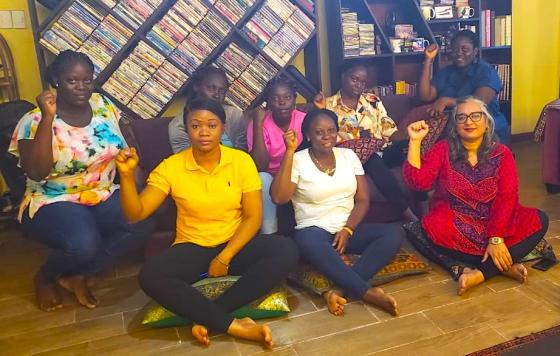Liberia: Feminist Group Condemns Zoe’s Demand for Money to End FGM

The Monrovia Feminist Study Circle has condemned the Montserrado county chief zoe’s demand for money as a condition for ending Female Genital Multilation (FGM).
The group claimed in a statement that even though traditional leaders rely on Sande Bush payments to exist, money cannot be used as leverage to stop the damaging practice.
“We consider Zoes as guardians of the patriarchy. Instead of cutting little girls using dirty blades, letting them bleed to death, causing lifelong suffering, we ask Zoes to listen to the pain of women. Demanding money while threatening to continue FGM, often through abducting girls, is abhorrent.”
Chief Zoe of Montserrado County, Massa Kandakai, told a group of journalists that FGM can only end if they are paid, disregarding the three-year ban endorsed by the government and National Traditional Council of Liberia — which is intended to slow down the cultural practice that many do consider harmful.
“I have two hundred proper Zoes in Montserrado alone, with about 2,000 across the country. How do they expect us to live when the Government is not living by their promises to us,” Kandakai emphasized.
Massa Kandakai is considered a senior Zoe, who holds leadership over hundreds of other traditional women who circumcise girls.
In light of the three-year prohibition on FGM, the group is urging the government to question the chief Zoe regarding her statement.
“We have learned from our study with Mae Azango, an investigative journalist during our 3rd study session on 26 November, that FGM has never stopped and schools are given licenses by Ministry of Interior. Moreover, Sande schools are even operating in the capital of Monrovia.
“Feminists ask for more clarity and transparency on agreements made between Traditional Leaders and the State. Why are licenses still being given to traditional schools by the Ministry Of Internal Affairs? Why are these schools now operating in urban areas? Why are we told a moratorium is in effect? Feminists demand answers from the State.”
According to them, the nature of the relationship between the Liberian State and Traditional Leaders was defined in the founding of Liberia.
“This relationship’s terms are based on co-existence as well as power sharing and has not changed over time. The State needs votes and Traditional Leaders need political patronage from the State. This is why FGM is a protected practice and, in fact, has been allowed to become a formalized livelihood and institution where both State and Traditional Leaders benefit. FGM is a crucial aspect of Sande schools, which are in the realm of Traditional Leaders, for whom schools are a form of patriarchal control. In this co-existence of vote exchange, political patronage, and licenses and fees, girls and women are sacrificed in the name of culture. Little girls and young women are being abused by both traditional patriarchy, capitalism and modern democracy.
“Feminists cannot abide the use of ‘culture’ as excuse to practice violence on women’s bodies.
“If FGM is indeed criminalized without disbanding other so-called Traditional structures, there is no guarantee patriarchal violence and control will be eliminated. As feminists, we need to remind ourselves of this risk,” the group said.
The group called for a radical transformation between the State and Traditional realm, based on addressing the legacy of settler colonialism and a more equitable economic and political system.
"We need a system that works for the people and protects all groups and identities. Within this transformation lies the true liberation of women from all patriarchal violence."
The Monrovia Feminist Study Circle is in solidarity with all the women who have been cut and, those fighting to end this violence against women.
